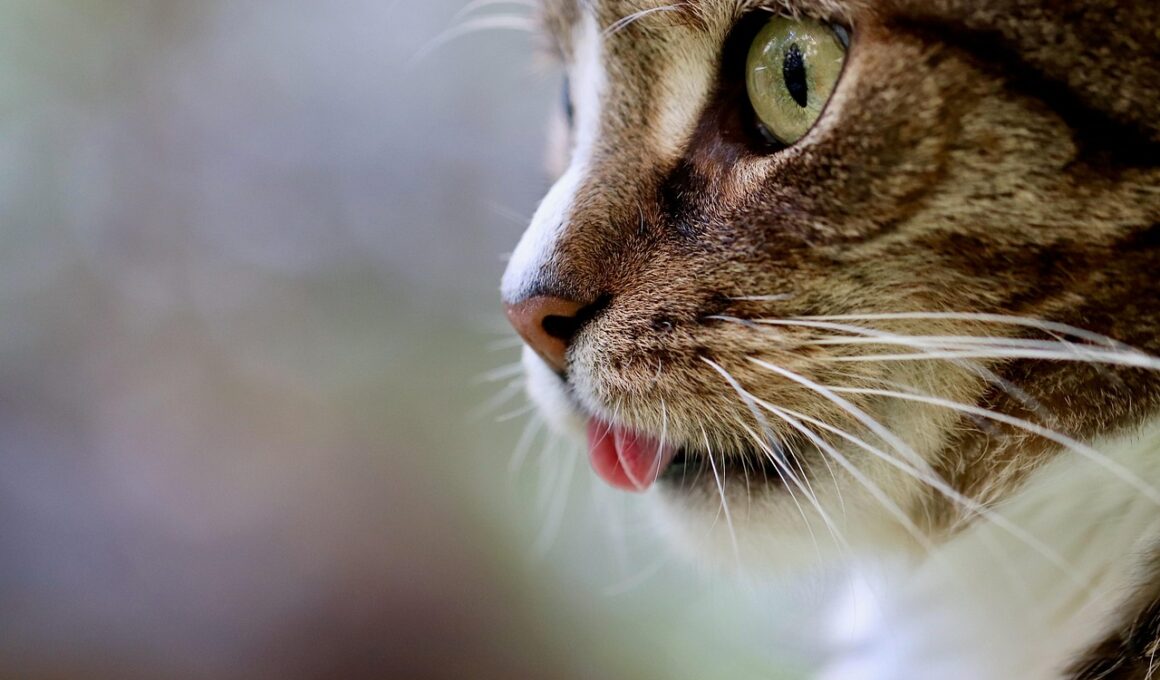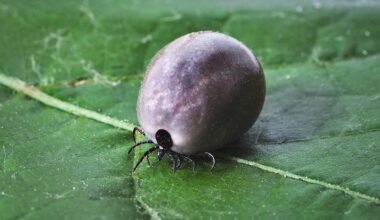How to Ensure Your Cat Gets Enough Taurine and Other Vital Nutrients
As a responsible cat owner, ensuring that your feline friend gets adequate nutrition is essential for their overall health. One vital nutrient that cats require is taurine, an amino acid that plays a crucial role in various bodily functions. Cats naturally cannot synthesize taurine, making it imperative for them to obtain it from their diet. A deficiency can lead to severe health issues, including heart disease and impaired vision. To prevent this, cat owners must feed their pets high-quality commercial diets rich in animal proteins. Look for labels that specify the inclusion of taurine. Additionally, learning about other essential vitamins and minerals can significantly improve your cat’s health. Regular visits to the veterinarian can also help monitor your cat’s dietary needs and health status. Furthermore, it’s important to understand how changing your cat’s diet can impact their well-being. Gradually introduce any new food to your cat’s diet to avoid gastrointestinal issues. The balance of nutrients is vital for maintaining a healthy weight and optimal energy levels in your furry companion. Remember that a well-rounded diet is the foundation of your cat’s health.
Another essential vitamin for cats is vitamin A, which they cannot produce in adequate amounts. This vitamin is predominant in animal tissues such as liver, which is why it’s crucial to include meat in their diet. Vitamin A is vital for maintaining healthy vision, skin, and immune function in cats. Deficiencies can lead to night blindness and a weakened immune system, making your pet susceptible to infections. Therefore, cat owners should ensure their cats are receiving sufficient quantities of vitamin A from high-quality food sources. Recent studies suggest that a diet deficiency in B vitamins can also hinder your cat’s health. B vitamins contribute to energy production and proper functioning of the nervous system, amongst other roles. Each B vitamin, like B12, B6, and thiamine, plays a unique role in maintaining optimal health. Cats may require supplementation if they are on specific diets or if they experience health issues that affect nutrient absorption. Always consult with your veterinarian before making dietary changes or introducing supplements to ensure that your pet gets the right amounts without overdoing it.
The Importance of Essential Fatty Acids
Essential fatty acids (EFAs) are another important group of nutrients that cats must obtain from their diet. Omega-3 and omega-6 fatty acids, mainly found in fish and flaxseed, are crucial for promoting healthy skin and coat, as well as reducing inflammation. A balanced intake of EFAs aids in the maintenance of cellular membrane health and can positively impact your cat’s overall health. Cats require a precise balance of these fatty acids for optimal functioning, as any deficiency may lead to skin issues and a dull coat. Alongside other vitamins, EFAs work in synergy to support health, enhancing your cat’s overall well-being. In addition to proper diet, watch for environmental factors that may affect skin health, such as indoor heating or excessive bathing. Providing your cat with access to natural sunlight can also contribute to their well-being and enhance vitamin D synthesis. Lastly, remember to monitor your cat for signs of skin problems or lack of energy, as this may indicate an imbalance in essential fatty acids. By maintaining an appropriate balance of these nutrients, you can contribute positively to your cat’s health.
In addition to the vitamins and nutrients mentioned above, minerals such as calcium and phosphorus are necessary for your cat’s health. These minerals are essential for strong bones and teeth, and they also play a role in various metabolic functions. A balanced ratio of calcium to phosphorus is crucial; imbalances can lead to significant health issues. Therefore, it is vital to source these minerals from premium quality cat foods formulated to meet your cat’s requirements. A lack of these essential minerals can lead to skeletal problems and other health complications. Regular veterinary check-ups can help in detecting any deficiencies early, allowing for timely intervention. If you are unsure about your cat’s mineral intake, a discussion with your veterinarian can provide you with valuable insights. Types of cat food vary significantly, and reading labels carefully will ensure that you make the best choices for your pet. Look for formulations that contain fish or meat, as these are typically richer in essential minerals. Considering overall nutrition is important for longevity and quality of life; balanced meals can prevent various diseases and enhance your cat’s health significantly.
Factors Affecting Nutritional Needs
Your cat’s age, activity level, and overall health can significantly influence its nutritional needs. Kittens, for instance, require different nutrient compositions compared to adult cats. A young cat needs a diet rich in proteins and essential nutrients to support their rapid growth and development. Puppies may also need more frequent meals throughout the day, while older cats often require less food but more balanced nutrition focusing on maintaining health. Obesity is another issue; many cat owners may not realize how easy it is to overfeed. Overweight cats can be at higher risk for diabetes and joint issues. Providing your cat with portion-controlled meals can aid in preventing obesity and associated health complications. Moreover, some cats may have specific dietary restrictions based on health conditions like allergies or kidney disease. Always consult with a veterinarian if you suspect your cat may have specific dietary needs or if their behavior around food changes unexpectedly. Tailoring their diet according to their life stage and health status is key to ensuring that they receive appropriate nutrients for optimal health.
Hydration is also an often overlooked aspect of a cat’s nutrition. Cats are not naturally inclined to drink lots of water, so their diets should ideally include high moisture content, especially if feeding dry food. Whether opting for wet or dry food, make sure your cat has constant access to clean water. Dehydration can significantly impact your cat’s health, leading to urinary tract problems and kidney issues. To ensure hydration, you may consider incorporating wet food into your cat’s diet regularly, as it provides hydration through moisture content. If you notice your cat doesn’t drink water often, you might want to try cat fountains that can attract them to drink more frequently. You can also add water or low-sodium broth to dry food to increase moisture intake. Paying attention to your pet’s hydration can prevent serious health concerns and contribute positively to their digestive health. Elevating their hydration levels can drastically improve their coat health and assist in their overall body function. Remember to monitor your cat’s litter box usage as well; infrequent urination might be a sign of dehydration.
Lastly, it’s important to consider the potential role of supplements when providing proper nutrition for your cat. While a well-balanced diet can typically offer necessary nutrients, some cats may benefit from additional supplementation if they are pregnant, recovering from illness, or have distinct dietary needs. Always consult your veterinarian before starting any supplements, as overdosing on specific vitamins or minerals can be harmful. Omega fatty acids and probiotics are examples of supplements that might promote health in specific circumstances. Probiotics, for instance, can support gut health, especially in cats experiencing digestive issues. When considering supplements, ensure you choose high-quality products specifically made for cats. Check with your vet for recommendations based on your cat’s health and dietary requirements. Monitor your cat’s response to any supplements closely, noting any changes in energy levels, coat condition, or digestive health. Understanding your cat’s unique needs will empower you to make the best choices for их health. Taking a holistic approach to nutrition encompasses diet, hydration, and supplementation for optimal well-being.
In conclusion, providing your cat with the right vitamins and essential nutrients is vital for their health and well-being. With a focus on taurine and other critical vitamins like A, EFA, and necessary minerals, owners can help their pets thrive. Regular veterinary check-ups can guide dietary decisions, ensuring your cat’s ongoing health needs are met. As responsible owners, it is our duty to educate ourselves about these nutritional needs. Regardless of life stage, specific dietary choices can play an indispensable role in maintaining their health. Finally, hydration and thoughtful supplementation can offer additional support, particularly for those with unique health circumstances. Always observe your cat’s behavior and consult with professionals when necessary. In doing so, you can contribute positively to their quality of life. A proper diet can lead to a longer, healthier life for your feline companion, enhancing their happiness and vitality. Make informed decisions today to help your cat enjoy a vibrant life fueled by proper nutrition and care. With these practices in mind, you’re one step closer to ensuring your beloved pet gets the nutrients they require.


